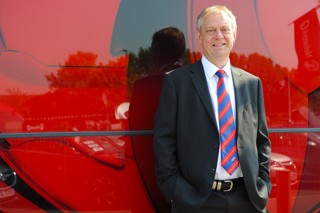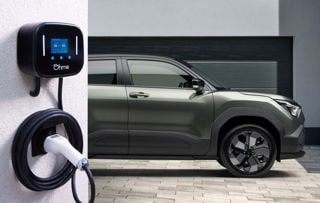Much has been made of Prime Minister Rishi Sunak’s recent pledge to boost the economy, with commentators analysing how his priorities for 2023 will impact various sectors.
He has promised to halve inflation to ease the cost of living crisis, and aims to give consumers financial security. At the same time, he also intends to grow the economy, creating better-paid jobs and opportunities in the process.
It feels like there is some much-needed stability on the horizon, but instead of using Sunak’s New Year speech as a springboard for my own forecasts and predictions, I will use my first AM Online column of 2023 to give some wider context to the automotive landscape and our collective direction of travel over the next 12 months.
As ever, we know we are working in a volatile market so we must be ready for the challenges that lie ahead. We are still seeing the impact of vehicle delays, and an ever-changing external environment as the cost of living crisis continues, so we must be on the front foot to navigate these as we head into this year.
But the good news is that, according to the latest data from the SMMT, new car registrations rose for the fifth consecutive month in December, with an 18% increase to about 128,000.
Specifically from a Volkswagen Group perspective, Volkswagen is the UK’s best-selling new car brand for the second year running. The breadth and depth of Volkswagen’s model range means that 131,850 new vehicles were registered in 2022, placing Volkswagen’s total UK sales above all other car brands, with a market share of 8.17% of the UK’s total new car market.
Furthermore, the UK has reclaimed its position as Europe’s second biggest market and the sector is expected to deliver growth worth £8.4 billion over the course of 2023.
Catering for demand
What is clear to me from these insights is that, whilst our industry continues to battle the lasting impacts of the COVID-19 pandemic, there remains huge demand amongst the British public for automotive travel solutions.
And I believe a major reason for this is, when we drill into the numbers, the vast majority of people in this country use a finance agreement to pay for their vehicle.
It’s a robust model that factors in flexibility and customer convenience, so that even in tough economic periods, buying a new car is still a sensible decision.
In order to facilitate this demand it’s incumbent on businesses to make their customer propositions as appealing as possible. We must refresh and renew our offers to fit with the times and at Volkswagen Financial Services UK, we always strive to put customers at the heart of everything we do.
In that respect, I think this is an exciting time for the industry, and businesses that are agile and dynamic will be in really good shape to succeed this year. I’m confident that we will now start to see a recovery from 2020.
There is no doubt that the world is changing, with consumers actively becoming more digitally savvy and more environmentally conscious, so businesses large and small need to have a real focus on operational readiness.
This leads me on to what’s in store for the rest of the year. Last year, the FCA proposed changes to our regulated activities and is introducing Consumer Duty, which sets out to improve the level of care provided to all customers.
These new regulations come into effect in July and in essence, we need to consider Consumer duty at every stage of our process and level of our organisation.
These changes will require us to ask ourselves what outcomes consumers should be able to expect from their products and services; act to enable rather than hinder these outcomes, and; assess the effectiveness of our actions.
The changes are some of the most fundamental to our industry in a long time. Each of us will have a role to play not only in responding to the change in the short-term, but in ensuring we meet these requirements once they come into force.
As a forward-thinking car finance provider, developing our eCommerce eco-system is a top priority for us, which is why we’re redoubling efforts to support in-life needs through our Customer Portal, allowing customers to self-serve, as well as provide tools and information that allow people to research their next vehicle at their fingertips.
Driving change
Another big story of 2023, in my view, will be the acceleration of the electric vehicle (EV) revolution.
Encouragingly, figures from the SMMT have revealed that the sale of new electric cars overtook diesel models in the UK for the first time last year.
The tide is evidently turning and electric vehicles are now widely accepted to be the future of sustainable travel in the UK. This is no longer hyperbole; the numbers speak for themselves. However, to unlock the incredible potential for zero emissions growth, the wider automotive industry must come together and champion the voice of consumers.
We know that public charging is still too expensive, distributed too unevenly and is too inaccessible for many people who would conceivably be in a position to make the switch to electric. Therefore, to become truly fit for the future, we need to be pushing for further Government investment in EV infrastructure.
That said, as we look ahead to the next 12 months, I believe (or should I say, I hope) the industry stabilises somewhat after an unprecedented period of turbulence.
The game-changing issue on our hands is the transition to green travel, but with cross-industry collaboration, investment in the right areas and a continuation of the great work from our retailer partners, I see no reason why our electric journey won’t stay on its surging upward trajectory.
Author: Mike Todd, CEO at Volkswagen Financial Services UK



















Login to comment
Comments
No comments have been made yet.